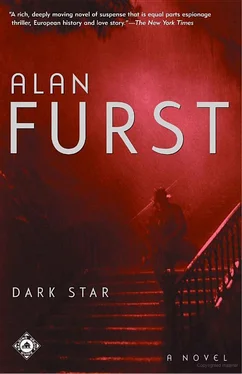Alan Furst - Dark Star
Здесь есть возможность читать онлайн «Alan Furst - Dark Star» весь текст электронной книги совершенно бесплатно (целиком полную версию без сокращений). В некоторых случаях можно слушать аудио, скачать через торрент в формате fb2 и присутствует краткое содержание. Жанр: Шпионский детектив, на английском языке. Описание произведения, (предисловие) а так же отзывы посетителей доступны на портале библиотеки ЛибКат.
- Название:Dark Star
- Автор:
- Жанр:
- Год:неизвестен
- ISBN:нет данных
- Рейтинг книги:3 / 5. Голосов: 1
-
Избранное:Добавить в избранное
- Отзывы:
-
Ваша оценка:
- 60
- 1
- 2
- 3
- 4
- 5
Dark Star: краткое содержание, описание и аннотация
Предлагаем к чтению аннотацию, описание, краткое содержание или предисловие (зависит от того, что написал сам автор книги «Dark Star»). Если вы не нашли необходимую информацию о книге — напишите в комментариях, мы постараемся отыскать её.
Dark Star — читать онлайн бесплатно полную книгу (весь текст) целиком
Ниже представлен текст книги, разбитый по страницам. Система сохранения места последней прочитанной страницы, позволяет с удобством читать онлайн бесплатно книгу «Dark Star», без необходимости каждый раз заново искать на чём Вы остановились. Поставьте закладку, и сможете в любой момент перейти на страницу, на которой закончили чтение.
Интервал:
Закладка:
Szara did as he was told. The officer concentrated on the Kringen identity documents and left him to stew, the standard procedure. “Herr Kringen?” he said at last.
“Yes.”
“Yes, sir.”
“Yes, sir.”
“What did you use to obliterate the birthdate? Lemon? Oxalic acid? Not urine -I hope for your sake I haven’t touched your piss.”
“Lemon, sir,” Szara said.
The officer nodded. He tapped the Kringen name with the eraser at the end of a pencil. “The actual Herr Kringen went into the Lutheran hospital to have a bunion removed from his foot. And while this poor man lay in a hospital bed, some little sneak made off with his papers. Was that you?”
“No, sir. It wasn’t me. I bought the passport from an orderly at the hospital.”
The officer nodded. “And you are?”
“My name is Bonotte, Jean Bonotte. I am of French nationality. My passport is hidden in the flap of my jacket.”
“Give it to me.”
Szara got his jacket off and with shaking hands tried to rip the seam open. It took a long time but the heavy thread finally gave. He placed the passport on the desk and put his jacket back on, the torn flap of lining hanging ludicrously down the back of his leg. Behind him, one of the detectives snickered. The officer picked up the telephone and requested a number. He turned the pages of the Bonotte passport with the pencil eraser. While he waited for his call to go through he said, “What reason have you for your visit to Germany? A mad impulse?” The detective laughed.
“I fled Poland, but could not find a way out of Lithuania.”
“So you obtained Kringen’s passport and came out with the Volksdeutsch from Riga?”
“Yes, sir.”
“Well aren’t you clever,” said the officer, looking at Szara carefully for the first time and meaning what he said.
They drove him to Columbia House, Gestapo headquarters in Berlin, and locked him in an isolation cell. Small but clean, a cot and a bucket, a heavily grilled window nine feet up and a light bulb in the ceiling. They weren’t entirely sure what they had, he guessed, not the sort of poor fish at whom they screamed, Spy! You will be executed! but, just maybe, the real thing, and that had to be handled at length and in a very different way. Perhaps with delicacy, perhaps not. If the decision was “not,” the next step was no secret. Szara could hear the screaming from distant parts of the building, and it sickened him and weakened his will to resist, as it was intended to.
Abramov, with evident distaste, had covered this possibility during the time of his training: nobody resists torture, don’t try. Tell them what you have to, it’s our job to keep you from knowing too much. There are two goals you must try to accomplish: one, the less you say in the first forty-eight hours the better-that gives us time-but in any event, feed them the least important material you can. You are just a low-level opportunist forced to work for the government-contemptible, but not important. And two, try to signal us that you’ve been caught. That’s crucial. We can protect a network from damage, close down everything you touched, and rescue your associates while we work through channels to get you free or at least to keep you from harm. The signals will change based on circumstance: a technical variation in wireless/telegraphy or simply vanishing from our sight while working in hostile territory. But there will certainly be a signal established and an appropriate way to deliver it. Remember, in this organization there is always a chance, we can do almost anything. “If you are taken,” Abramov had said, “you must cling to hope as a sailor cast into the sea clings to a spar.”
Szara closed his eyes and rested his head against the cold cement wall. No, Sergei Jakobovich -he addressed Abramov’s departed soul- not this time. Hope, despair-all such fancies were now entirely beside the point. He’d at last made the error that could not be overcome. Had not sufficiently understood the capability, the magnitude, of the German security machine-not until he’d seen the long sheet of yellow teletype paper with the name KRINGEN in the left-hand column. The identity that had been purchased in Paris would not hold up, not once they went to work on it, it wouldn’t. When he worked his way back through the last two years of his life-Khelidze, Renate Braun, Bloch, Abramov, the OPAL network, then de Montfried and the British, finally the assignment in eastern Poland-he saw himself as a man willing to do almost anything in order to stay alive. He’d not done badly, had lasted a long time compared to the others-the intellectuals, Old Bolsheviks, Jews, foreign communists. Had outlived almost all of them, twisted and turned, lied and schemed, survived.
But it was not meant to be, and this he faced.
He suspected that what he’d almost done to himself in the Pripet marsh, the day he’d crossed into Lithuania, had been a shadow of the future-somehow he’d sensed that he was living out his last few days. But he had slightly misread the omen; he wasn’t done with life, that wasn’t it. Life was done with him. And in his deepest heart, he wondered if he hadn’t come to Berlin knowing that he would find a way to Tscherova, an unconscious appeal to fate to let him passionately love a woman once more before he left the earth. If so, his wish had been granted, and now it was time to accept the inevitable cost of the bargain. He marveled at the coldness of his heart. The time of dreams and delusions was ended; he saw the world, and himself, in perfect clarity. Certain obligations remained-to protect Tscherova, principally-but there were others, and he would now plan how to sacrifice himself in the most effective way. How late, he thought, strength comes to some people.
The interrogator was called Hartmann. An SS Obersturmbannfuhrer, a major, a well-fed man with a placid face and small, carefully groomed hands, who addressed him politely. Hartmann was nothing more, Szara realized, than the intake valve of an information machine. He existed to acquire facts-perhaps a lawyer, or some functionary in a judicial system, before being called to his present duty by the Nazi party. He did not process the information. That happened elsewhere, far above him in the hierarchy, where an administrative panel, a directorate, made decisions.
To begin with, Hartmann pointed out that if they were straightforward with each other, all would turn out for the best. He implied, without actually saying it, that his job was best done if Szara did not have to be taken to the cellars; they were, together, men who could proceed with their obligations-Szara’s to confess, Hartmann’s to certify the quality of that confession-while remaining innocent of such measures. That sort of thing was for another sort of person.
Szara did not resist. He cooperated. By the afternoon of the first day he had to admit he was not Jean Bonotte. Hartmann had provided paper and pencil and asked him to write a biography, beginning with his childhood in Marseille-names and places, schools and teachers. “I cannot write such a biography because I did not grow up there,” Szara said. “And I am not named Jean Bonotte.”
“This passport is a forgery, then,” Hartmann said.
“Yes, Herr Obersturmbannfuhrer, it is.”
“Then will you tell me your true name? And your nationality, if it is not French?”
“I will,” Szara said. “My real name is Andre Aronovich Szara. As for my nationality, I was born a Polish Jew when Poland was a province of Russia. By 1918 I was living in Odessa, and so remained a citizen of the Soviet Union, eventually becoming a journalist for the newspaper Prcwda.”
Hartmann was puzzled. “Is it a newspaper that sent you to Berlin? With false identity? I wonder if you could clarify this.”
Читать дальшеИнтервал:
Закладка:
Похожие книги на «Dark Star»
Представляем Вашему вниманию похожие книги на «Dark Star» списком для выбора. Мы отобрали схожую по названию и смыслу литературу в надежде предоставить читателям больше вариантов отыскать новые, интересные, ещё непрочитанные произведения.
Обсуждение, отзывы о книге «Dark Star» и просто собственные мнения читателей. Оставьте ваши комментарии, напишите, что Вы думаете о произведении, его смысле или главных героях. Укажите что конкретно понравилось, а что нет, и почему Вы так считаете.












